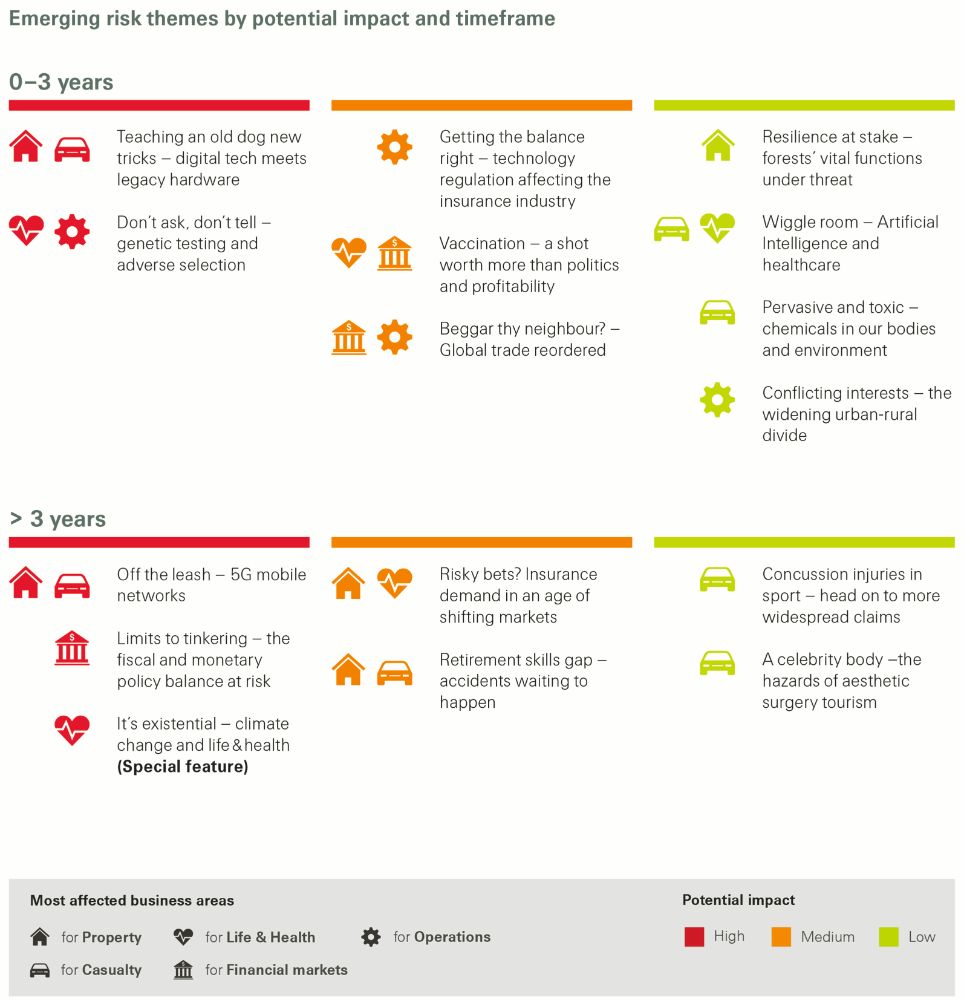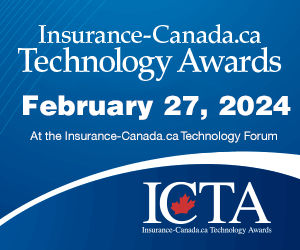“Slow-burner” emerging risks including the public health implications of climate change
- Swiss Re Institute’s annual SONAR report features 15 emerging risk themes and 5 emerging trend spotlights the re/insurance industry needs to have on its radar
- Digital technology’s clash with legacy infrastructure, new risks emerging from the spread of 5G mobile networks, increasingly limited fiscal and monetary policy flexibility, and genetic testing and its implications for the insurance industry are challenges with potentially high impact
- Other risks and trends presented in the report range from increased global vaccine hesitancy to geographically shifting markets
Zurich (May 22, 2019) – Digital technology’s clash with legacy hardware, new risks emerging from the spread of 5G mobile networks, increasingly limited fiscal and monetary policy flexibility, and genetic testing and its effects on the insurance industry, as well as the effects of climate change on public health, are some of the key risks identified in this year’s Swiss Re Institute SONAR report. The publication is based on the SONAR process to pick up early signals of what lies beyond the horizon.
The identified risks are relevant to life and non-life insurance areas, asset management as well as operations and insurance market conditions. They are presented with the goal of helping industry players prepare for new scenarios by adapting their behaviour, market conduct and product portfolios.
The five risks with high potential impact on the industry are:
(1.) New technologies meet ageing infrastructure
Technological improvements are ongoing. Hardware in areas of critical infrastructure, including smart electric power grids or pipelines and hospitals, however, is often outdated. As a consequence, insurers face higher risk accumulation and unexpected loss potential in the areas of property damage, bodily injury, business interruption and cyber risk.
(2.) The spread of 5G technology
5G will enable wireless connectivity in real time for any device of the internet of things (IoT), such as autonomous cars or sensor-steered factories. Current concerns regarding potential negative health effects from electromagnetic fields are likely to increase. In addition, hackers can also exploit 5G speed and volume to acquire (or steal) more data faster. Major concerns are possible privacy and security breaches, as well as espionage.
(3.) Limits to central bank tinkering
There is a growing consensus that another economic downturn will need a fiscal response. The re/insurance industry could benefit if changes to policy bring growth and financial stability. However, a rise in uncertainty, causing higher financial market volatility and declines in asset valuations, is a potential risk factor.
(4.) The growth of genetic testing
Over the past years, the cost of genetic testing has declined significantly and with direct-to-consumer (DTC) testing kits, genetic tests are now increasingly available and affordable for individual use. They have been widely adopted by public health systems and individuals. This has significant implications for life insurers, both in regard to data management and regulatory constraints.
(5.) Climate change and public health
The most pronounced risks from climate change affecting human health stem from heatwaves, floods, droughts, fires and vector-borne diseases. Millions of lives and healthcare services could be at risk. Without action, mortality rates and healthcare costs could soar, with significant consequences for the health, workers’ compensation and life insurance lines of business.
“Swiss Re and the insurance industry at large first flagged climate change as an emerging risk many decades ago”, says Patrick Raaflaub, Swiss Re’s Group Chief Risk Officer. “The risk has now ’emerged’ but associated and challenging uncertainties still remain, such as the implications on Life & Health insurance,” Raaflaub adds.
The report offers insights into emerging risks and highlights a number of emerging trend spotlights. Emerging risks are newly developing or evolving risks that are difficult to quantify, but potentially have a significant impact on the industry and society. Emerging trend spotlights examine early development, which may offer both opportunities and risks for the insurance industry in the future. The report is distributed among clients and the wider stakeholder community in order to inform the debate about emerging risks and facilitate the finding of solutions.
About the SONAR report
The annual SONAR report aims to initiate an informed dialogue about the future risk landscape that might lie ahead. While Swiss Re has been monitoring emerging risk related to climate change since 1989, the 2019 SONAR report highlights expected but still uncertain effects on public health and the insurance sector.
Read the Swiss Re SONAR 2019 report here: SONAR 2019: New emerging risk insights
About Swiss Re
The Swiss Re Group is one of the world’s leading providers of reinsurance, insurance and other forms of insurance-based risk transfer, working to make the world more resilient. It anticipates and manages risk – from natural catastrophes to climate change, from ageing populations to cyber crime. The aim of the Swiss Re Group is to enable society to thrive and progress, creating new opportunities and solutions for its clients. Headquartered in Zurich, Switzerland, where it was founded in 1863, the Swiss Re Group operates through a network of around 80 offices globally. It is organised into three Business Units, each with a distinct strategy and set of objectives contributing to the Group’s overall mission. For more information, please visit www.swissre.com.
SOURCE: Swiss Re
Tags: climate change, SONAR report, Swiss Re



